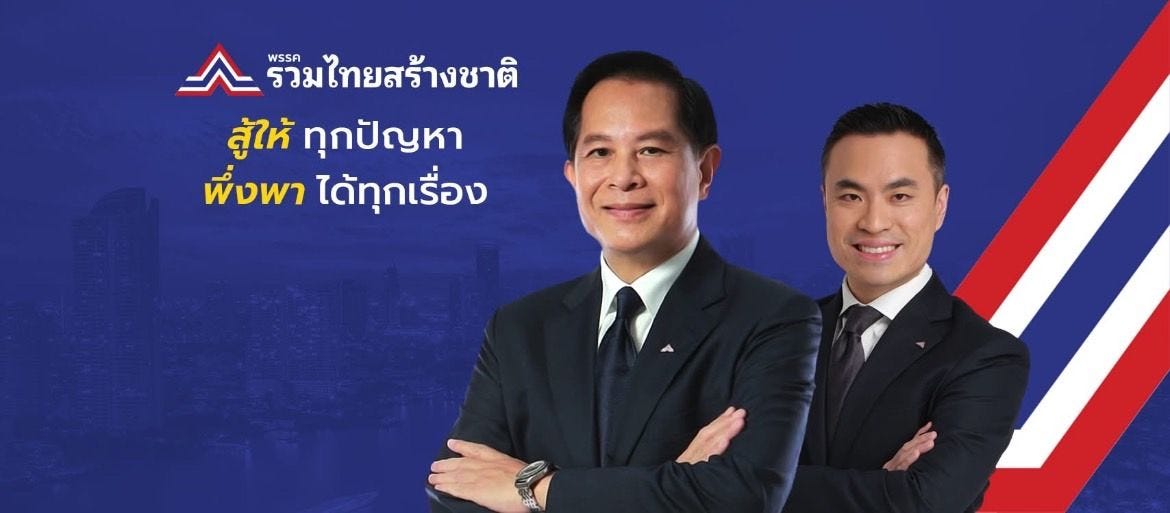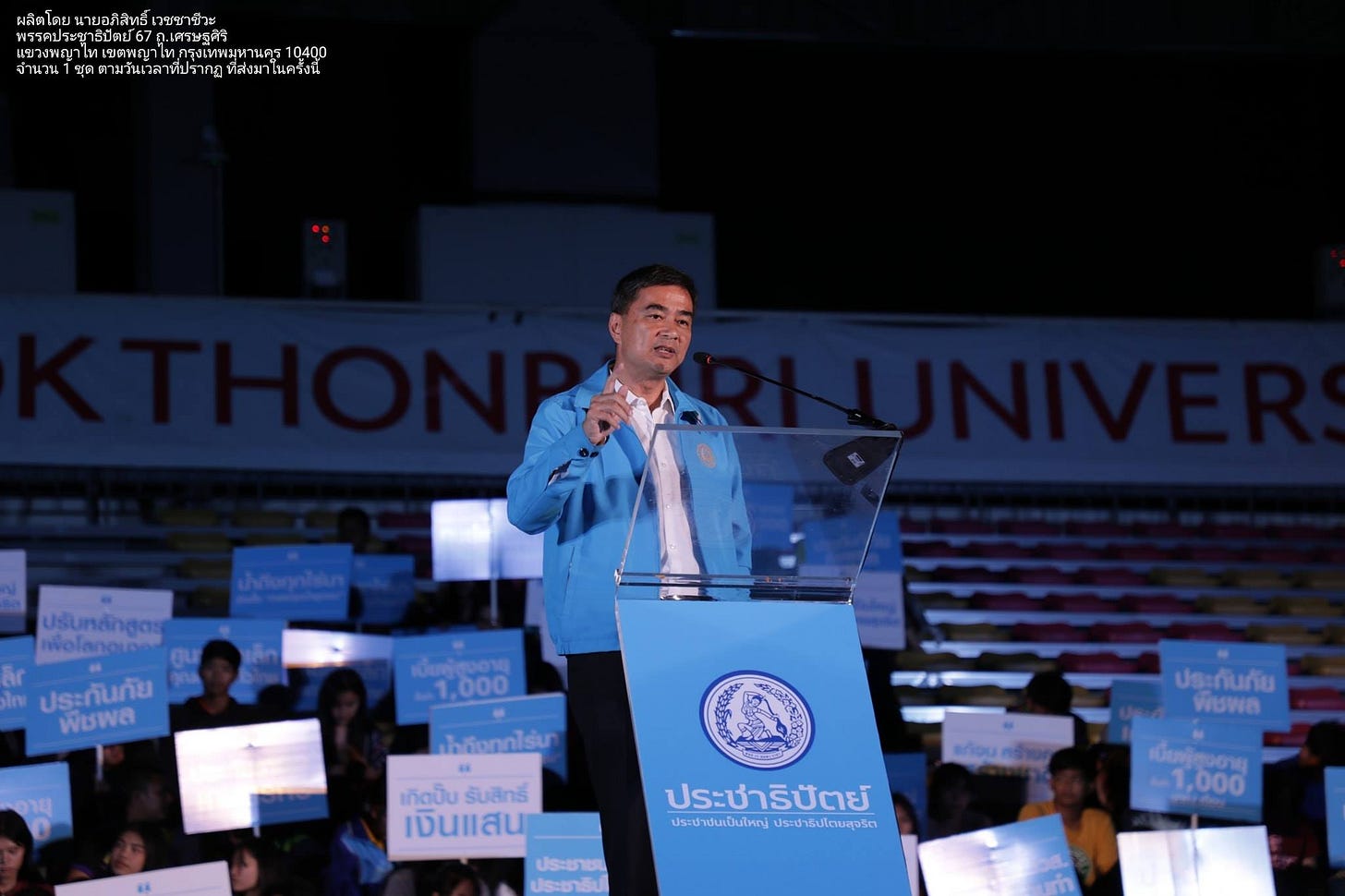Rupture and Renewal
Major changes in the United Thai Nation and Democrat parties
Despite the fact that we have a new prime minister, there has been no lull in activity in the Thai party landscape. A few weeks ago, I wrote about the fragmentation of Thailand’s conservative parties. Somehow the piece is already out of date. Bhumjaithai is now in pole position as the party of government, and it is rebranding itself into a more nationally-focused force.
Bhumjaithai’s future success in a general election will depend on whether it can fully capture the conservative electorate, however. This week saw several developments from other parties that could impact Bhumjaithai’s future trajectory.
The Disunited United Thai Nation Party
Firstly, we saw the United Thai Nation Party’s internal issues spill out into the open. Formed as a vehicle for former prime minister Prayut Chan-o-cha at the 2023 general election, the party has appeared to be searching for direction since Prayut retired from politics. Without Prayut himself, the UTN has argued that it carries “Prayut’s DNA.” But several forces have worked against the party. Its leader, Pirapan Salirathavibhaga, appears to be quite media-averse, although his supporters argue that he has been focused on his work as Energy Minister. The leadership has also struggled at party management, with the Suchart Chomklin faction having defected a long time ago.
The crisis of party management reached new levels recently, with media reports saying that disagreements emerged between Pirapan and the party secretary general, Akanat Promphan, over whether the UTN should continue backing Pheu Thai after Paetongtarn Shinawatra was ousted as prime minister. We know that eventually, no UTN MP supported Pheu Thai’s candidate for prime minister Chaikasem Nitisiri, with most voting for Anutin Charnvirakul and a few abstaining.
But citing “differences in thinking,” Akanat resigned as UTN secretary-general this week. He was photographed having dinner with Anutin, intensifying speculation that he might move to Bhumjaithai. (Some reports say that around five MPs are loyal to Akanat). He said to the media that moving to Bhumjaithai is “an option” but was still noncommittal.
One faction of the UTN did already commit. Chumphol Julasai, an influential figure in Chumporn province, brought over fifty local politicians from his faction to the Bhumjaithai headquarters. This is a major boost to Bhumjaithai’s hopes to dominate the Southern region. Pirapan appears to be set on continuing as party leader, planning a reorganization of the party’s top leadership in preparation for the next general election. But with so many defections from the party — especially its southern politicians with local strongholds — the UTN will find competition with Bhumjaithai highly difficult.
A Democrat Renewal?
To fully dominate the South, however, Bhumjaithai will still have to reckon with another party: the Democrats. Even as the Democrat brand has experienced significant erosion over the past few years, in 2023 major swathes of the South — the party’s historical stronghold —was still covered in light blue. Many were predicting that the Democrats were now finally entering a period of terminal decline, but the almost 80-year old party could potentially prove the doubters wrong.
On September 13, the Democrat leader, Chalermchai Sri-orn, suddenly resigned. Chalermchai cited health problems, saying that some days his blood pressure reached 200 and rejecting rumors that he was resigning over internal conflict within the party. The reports are persistent, however: Naewna Online states that things had reached a boiling point when the party secretary-general, Dech-it Khaothong, had joined the Pheu Thai delegation to the People’s Party and said to the media that he had “forgotten” to tell Chalermchai that he was doing this. Whatever the reason, Chalermchai’s resignation opened up a power vacuum within the party.
This immediately opened up speculation about whether or not the road was open for former prime minister Abhisit Vejjajiva, who had left the Democrats in December 2023, to mount a comeback. Senior party figures such as former leaders Chuan Leekpai and Banyat Bantadtan voiced support for Abhisit’s return. But that is not a surprise, and in any case Chuan’s faction within the Democrats had mostly been sidelined after 2023. More intriguingly, deputy leader Chaichana Dechdecho, who has not been aligned previously with Chuan, said that Abhisit should return as party leader. He also posted a picture of himself having coffee with former deputy leader and Abhisit ally Korn Chatikavanij.
Abhisit’s return would yield several electoral dividends for the Democrats. He has more name recognition than virtually any other politician in the party. He could “bring home” many former Democrat voters who had become disappointed with other alternative parties, and he is untainted by the frantic cross-party dealmaking over the past few years. His return does not guarantee the party’s revival, but it would probably give the Democrats at least a fighting chance at survival.
But it is not yet clear that a comeback would be possible. Samard Rachapolsith, a former deputy leader, wrote that in a leadership election, MPs are allocated 40 percent of the vote, the executive committee is allocated 20 percent, and all other voters (such as former ministers and representatives of local branches) are allocated another 40 percent. This means that a victorious candidate would need strong support from MPs and the executive committee to win.
It seems unlikely that the current power-holders within the party would suddenly just turn over the keys. Things are especially confusing now because some Democrat factions are already gearing up to defect to Bhumjaithai, so would they continue participating in a leadership election? If Chaichana is willing to support Abhisit, that gives him a base within the party. But will it be enough? The leadership election is scheduled for October 18th: it will be an interesting month in the Democrat Party.
Other headlines this week
Prime Minister Anutin Charnvirakul’s cabinet is nearing its completion. I wrote last week about the “outsider appointments,” but I’ll wait until everything is finalized before commenting on the rest of the cabinet. There were reports that there has been a snag with some prospective ministers deemed unsuitable.
Pheu Thai beat the People’s Party in a byelection in Chiang Rai’s 7th district by 45,615 votes to 19,862 last Sunday. (This seat was vacated by the deputy speaker in August). It’s a sizable margin — Pheu Thai’s lead had not been quite so big in the 2023 general election — and it will hearten Pheu Thai in knowing that despite all its recent political troubles, its local MPs can still earn support. But I would not extrapolate from this byelection to the upcoming general election; after all, Move Forward struggled mightily in local byelections during the previous parliament only to then emerge as the winner in 2023.




Regarding Abhisit: May 2010 is forgotten (contrary to October 1973 and May 1992).